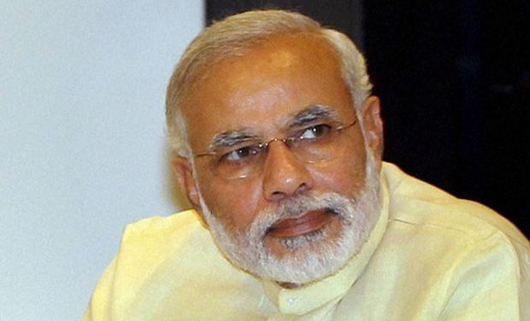New Delhi, Oct 11: Terming Emergency as the biggest blow to democracy, Prime Minister Narendra Modi today said its memories should be kept alive to further fortify the democratic structure as the struggle against it gave birth to a new generation of leaders and a new kind of politics in the country.

"Emergency was the biggest blow to democracy. The kind of crisis that hit the country during that period had tempered the Indian democracy which came out stronger. I am grateful to those who struggled and fought against it. ...
"Emergency should be remembered not to cry or brood over what had happened then, but to strenghten our resolve to fortify and further strengthen the democratic values and framework in our country," Modi said at a programme 'Loktantra Prahari Abhinandan' to mark Loknayak Jayaprakash Narayan's 113th birth anniversary.
Paying glowing tributes to the Loknayak, he felicitated many of those who fought against Emergency and went to jail in 1975-76, including BJP veteran L K Advani and Akali Dal chief Parkash Singh Badal.
The Prime Minister earlier also visited the residences of former Prime Minister Atal Bihari Vajpayee and former NDA Convenor George Fernandes who had played a significant role in the fight for democracy in those days.
"The biggest message that came out of the anti-Emergency struggle was the inspiration to fight repression. So many people in politics today owe their initial days to those days of Emergency, JP Movement, Navnirman Movement ... they gave birth to a new kind of politics in the nation," the Prime Minister said.
Modi said "we do not want to remember Emergency to criticise someone, but to constantly be reminded of commitment towards democracy and freedom of press."
He said the Indian media may have its preferences, but it should never let people of forget the days of Emergency.
"Media should not let the country forget Emergency," he said, adding that the leadership born during Emergency was not one for TV screens. "It was a leadership committed to live and die for the nation."
Attacking then Prime Minister Indira Gandhi for imposing Emergency, Modi said something good emerges even from a bad and the struggle that ensued during that period helped strengthen democracy.
Noting that the struggle by Jayaprakash Narayan for democracy should be treated as a benchmark, he said his speeches reflected the "deep anguish" of the people who had suffered during Emergency. "Even though he was a soft-spoken man, his speeches were like the boiling lava."
Observing that democratic values are inherent among Indians, Modi said though the top political leadership was in jail when elections were announced by then Prime Minister Indira Gandhi, it was the people who sent home many bigwigs by exercising their franchise.
While there was one view at that time to boycott these elections, another view was to take part in them, he said.
"When elections were declared in 1977, the top leadership was in jail. No one knew what was happening outside. But see the strength of people and their respect for democracy. Elections were held in the shadow of fear, people did not attend public meetings due to fear. But voters sent home many bigwigs by employing the mighly tool of democracy," he said.
Modi said Indira Gandhi was more bothered about her image abroad than within the country, he said, adding that several opposition leaders went to foreign countries to spread the word against repression.
Paying glowing tributes to Jayaprakash Narayan, Modi said, "JP's message of total revolution should give us the strength to convert it into the form of total development while bringing about 'sabka saath, sabka vikas' and to further strengthen democracy."
He also lauded JP for being a person with an open mind who was not restricted to any one thought or ideology. "He lived for the truth and what he felt was right," he said.
Modi also recalled how he had worked closely with veteran leader L K Advani, whom he saw closely during the Emergency and highlighted the role played by Akali leaders who differed with the political views of those in power at the time.
He lauded Punjab Chief Minister Parkash Singh Badal as the 'Nelson Mandela of India', saying "he has spent so many years in prison and that too for political reasons."
"The programme to mark JP's birth anniversary was a great walk down the memory lane, with those who participated in anti-Emergency movement," he later tweeted.
Modi's comments on Jayaprakash Narayan came a day ahead of the first phase of polling in the Bihar assembly elections.
Besides Advani and Badal, among others felicitated at the function were four Governors -- Kalyan Singh, O P Kohli, Balram Dass Tandon and Valubhai Vala, former Deputy Speaker Kariya Munda, besides BJP leaders V K Malhotra, Jaywantiben Mehta and Subramanian Swamy, NCP leader D P Tripathi, Kameshwar Paswan and Arif Baig.
Advani said the focus after independence was not just on freedom from colonialism but also on strengthening democratic framework, while Badal said JP was one who thought of integrating and developing villages. "JP was an institution, he was a light house and a role model," Badal said.
Describing JP as "an all-party man", Union Minister Venkaiah Naidu said that is why he could bring about such a change in the country.





Comments
Add new comment